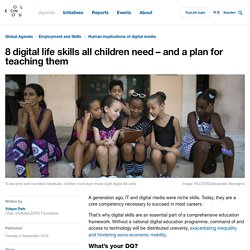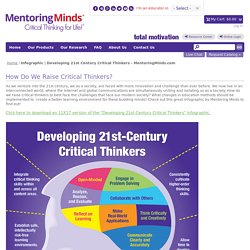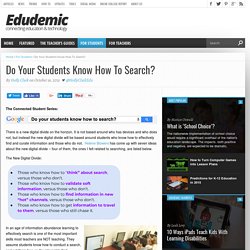

Digital Copyright. 8 digital life skills all children need – and a plan for teaching them. A generation ago, IT and digital media were niche skills.

Today, they are a core competency necessary to succeed in most careers. That’s why digital skills are an essential part of a comprehensive education framework. Without a national digital education programme, command of and access to technology will be distributed unevenly, exacerbating inequality and hindering socio-economic mobility. What’s your DQ? The challenge for educators is to move beyond thinking of IT as a tool, or “IT-enabled education platforms”. Like IQ or EQ – which we use to measure someone’s general and emotional intelligence – an individual’s facility and command of digital media is a competence that can be measured. DQ can broadly be broken down into three levels: Level 1: Digital citizenship.
Poster and evidence sheet.pdf. Teaching Adolescents How to Evaluate the Quality of Online Information. An essential part of online research is the ability to critically evaluate information. This includes the ability to assess its level of accuracy, reliability, and bias. In 2012, my colleagues and I assessed 770 seventh graders in two states to study these areas, and the results definitely got our attention. Unfortunately, over 70 percent of the students’ responses suggested that: Middle school students are more concerned with content relevance than with credibility They rarely attend to source features such as author, venue, or publication type to evaluate reliability and author perspective When they do refer to source features in their explanations, their judgments are often vague, superficial, and lacking in reasoned justification Other studies highlight similar shortcomings of high school and college students in these areas (see, for example, a 2016 study from Stanford).
So what can you do to more explicitly teach adolescents how to evaluate the quality of online information? Infographic. As we venture into the 21st century, we as a society, are faced with more innovation and challenge than ever before.

We now live in an interconnected world, where the Internet and global communications are simultaneously uniting and isolating us as a society. How do we raise critical thinkers to best face the challenges that face our modern society? What changes in education methods should be implemented to create a better learning environment for these budding minds? Check out this great infographic by Mentoring Minds to find out! Click here to download an 11X17 version of the "Developing 21st-Century Critical Thinkers" infographic. Embed This Image On Your Site (copy code below): <div style="clear:both" _mce_style="clear: both;"><a href=" _mce_href=" align="center" src=" _mce_src=" title="Developing 21st Century Critical Thinkers" width="900" height="5077" border="0" /></a></div><br/><br/><div>Courtesy of: <a href=" _mce_href=" Minds</a></div>
Do Your Students Know How To Search? The Connected Student Series: There is a new digital divide on the horizon.

It is not based around who has devices and who does not, but instead the new digital divide will be based around students who know how to effectively find and curate information and those who do not. Helene Blowers has come up with seven ideas about the new digital divide – four of them, the ones I felt related to searching, are listed below. The New Digital Divide: In an age of information abundance learning to effectively search is one of the most important skills most teachers are NOT teaching.
Teachers – especially in the elementary grades -need to develop a shared vocabulary around the skill of searching.